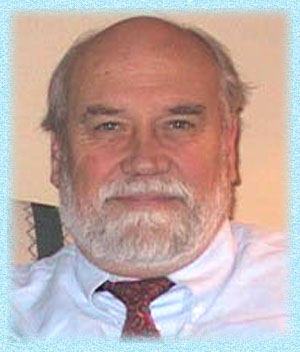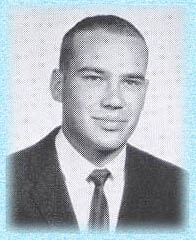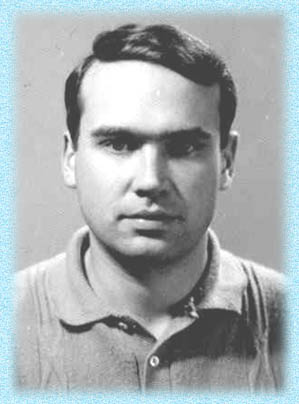


INTERVIEWER: So once you were commended by the Brethren church, what did you do then? You went over to Europe?
MALSTEAD: We went to Turkey. Okay, we went over to Europe. George was in Europe. And
he had been already over for a year or so, and had started the work in Spain, and was...you know,
there were already about twenty-five Spaniards who had linked in, you know, with George in
evangelism and in doing the correspondence course and things. Well, from the earliest days,
Russia was one of our burdens, Eastern Europe. And so George, while he was in Spain, attended
the university there and got...took a first course...his first course in Russian. So he had learned
the Russian voca...alphabet and, you know, initial words and a little bit of the grammar, and
things like that, whatever you do in one year of Russian. And he said, "Roger," he said, "let's
take an exploratory trip into Russia and let's see, you know, what we can do." Here I am, you
know, nineteen, just off the boat from the States. "Sure!" [laughs] I mean, you know,
"Whatever!" [laughs] Anyway, so we went to...we went through Paris and we did....he was
lining up some....I think that's were we got the Russian Gospels of John from a Bible Society
there, did some literature distribution, then drove over to Vienna. And there were able to...we
were able to rent a Russian typewriter. And the plan was that we would type envelopes and
then...and put a Gospel of John in these envelopes and some kind of a tract. Well, we didn't have
any Russian tracts. So we got the idea to take...to get two huge rubber stamps like this that
would print...you know, one would cover that and one...by doing two we could print a half of an
eight and a half by eleven tract on one side. So we got a Russian translator, a believer there in
Vienna. He translated it. We got an address in Switzerland. George made a few phone calls. So
if people wanted to write in for a Russian correspondence course they could. And so we
got...stuck that rubber stamp way up under the dashboard, set the typewriter just in the back, (it
 was a little Opel station wagon), took off the inside panels and stacked the Gospels between the
interior and the outer part of the car, and put the panels back on, couple reams of paper, some
ink. But we didn't have any addresses. Well, we started to ask around and we found a socialist...a socialist bookshop in Vienna. And we went in there thinking, you know, there'd be
something, you know, some almanac or something we could get some addresses out of. So
George was in one part and I went into the used book section, (there was just a bunch of old
books in this...) and I found this old book in Russian that looked like lists. And I didn't know
what it was, but I said, "George, what's this?" And he came over and, you know, went through it,
tried to read some of the front, and went up and asked the guy at the...at the cash register if he
any knew any Russian. He didn't. But some guy there said he thought it was a list for some
certain province of secondary school teachers [laughs]. So we said, "Fine, we'll buy it." We paid
a dollar or something for the book and we had our addresses [laughs] with a list of the high
school teachers in one...one or two provinces...one section. I don't know why they did it,
and...but that's what it was. So we stuck that in and took off. Got our visas to camp was all...all
we could do. So we...you had to have, you know, certain...amount of money in advance and all
this and that, and we got all that done. Drove through Czechoslovakia into the southern part of
Russia and went to Lvov. What we were...that was...we were going to head for was Lvov,
L-V-O-V, and across the border to the first thing and camped. And then the next day we took
off, and.... We had also put the Gospels under the food. You know, we had bought food:
bologna and cheese and bread and butter and I don't know what all...fruit. So we...we had extra
Gospels. We couldn't get them all, so we put them on the bottom and piled all the food in. We
didn't think people would look through that. And they didn't. But it was so hot that day that the
butter melted onto the Gospels. And that night we went into the...there was no campground the
sec...the first or the second night, I guess it was. And so here are these Gospels, the covers were
soaked with butter, but if you pulled the cover off the Gospel was okay. You know, the old
Gospels, the Bible Society would just put one or two staples in. And I said, "Let's just get rid of
them George. They're no good." He said, "No, we'll just take the covers off." [laughs] And it
was okay. So he...I wasn't going to mess with that...so he took all the covers off. And the next
day as we were driving along, as people were walking along he would...we'd...he'd say, "Slow
down," and he'd hand them a Gospel with no cover on it. It was intact. Well, we went by one
fellow and we slowed down and what...I don't know what happened. I think Georgia handed him
the Gospel, he dropped it, but there was no staple in it. The staple had come out. And so all the
pages just fluttered. And George says, "Well, let's go on." [laughs] So we went on and I looked
in my rear view mirror and another car had stopped and somebody was picking up these pages.
And I said, "George, I think our time has come to an end. [laughs] This trip is c.... He said,
"No, let's go on." So we went on. And we got to the next little town and here was a guy in the
middle of the road with a machine gun [laughs] standing there. I says, "I think we'd better stop."
[laughs] So we pulled over, naturally. And there we were questioned for a couple of days in this
little town of [pauses] Redovno or something like that...Redovno.... Anyway, it's in that article.
So they questioned us all the rest of that day. And they didn't know what to do. I mean, they just
didn't know what to do, and.... So then we started playing soccer (we had a soccer ball) with
some of the guards there. The guy with the machine gun, we started playing soccer with him. It
was very low key thing. And then they...they said, "Now, you leave your passports here, but you
stay in that hotel." So they took our passports but...and we had...and they said, "Don't leave.
You can walk around but don't leave the town." So they locked up our car.
was a little Opel station wagon), took off the inside panels and stacked the Gospels between the
interior and the outer part of the car, and put the panels back on, couple reams of paper, some
ink. But we didn't have any addresses. Well, we started to ask around and we found a socialist...a socialist bookshop in Vienna. And we went in there thinking, you know, there'd be
something, you know, some almanac or something we could get some addresses out of. So
George was in one part and I went into the used book section, (there was just a bunch of old
books in this...) and I found this old book in Russian that looked like lists. And I didn't know
what it was, but I said, "George, what's this?" And he came over and, you know, went through it,
tried to read some of the front, and went up and asked the guy at the...at the cash register if he
any knew any Russian. He didn't. But some guy there said he thought it was a list for some
certain province of secondary school teachers [laughs]. So we said, "Fine, we'll buy it." We paid
a dollar or something for the book and we had our addresses [laughs] with a list of the high
school teachers in one...one or two provinces...one section. I don't know why they did it,
and...but that's what it was. So we stuck that in and took off. Got our visas to camp was all...all
we could do. So we...you had to have, you know, certain...amount of money in advance and all
this and that, and we got all that done. Drove through Czechoslovakia into the southern part of
Russia and went to Lvov. What we were...that was...we were going to head for was Lvov,
L-V-O-V, and across the border to the first thing and camped. And then the next day we took
off, and.... We had also put the Gospels under the food. You know, we had bought food:
bologna and cheese and bread and butter and I don't know what all...fruit. So we...we had extra
Gospels. We couldn't get them all, so we put them on the bottom and piled all the food in. We
didn't think people would look through that. And they didn't. But it was so hot that day that the
butter melted onto the Gospels. And that night we went into the...there was no campground the
sec...the first or the second night, I guess it was. And so here are these Gospels, the covers were
soaked with butter, but if you pulled the cover off the Gospel was okay. You know, the old
Gospels, the Bible Society would just put one or two staples in. And I said, "Let's just get rid of
them George. They're no good." He said, "No, we'll just take the covers off." [laughs] And it
was okay. So he...I wasn't going to mess with that...so he took all the covers off. And the next
day as we were driving along, as people were walking along he would...we'd...he'd say, "Slow
down," and he'd hand them a Gospel with no cover on it. It was intact. Well, we went by one
fellow and we slowed down and what...I don't know what happened. I think Georgia handed him
the Gospel, he dropped it, but there was no staple in it. The staple had come out. And so all the
pages just fluttered. And George says, "Well, let's go on." [laughs] So we went on and I looked
in my rear view mirror and another car had stopped and somebody was picking up these pages.
And I said, "George, I think our time has come to an end. [laughs] This trip is c.... He said,
"No, let's go on." So we went on. And we got to the next little town and here was a guy in the
middle of the road with a machine gun [laughs] standing there. I says, "I think we'd better stop."
[laughs] So we pulled over, naturally. And there we were questioned for a couple of days in this
little town of [pauses] Redovno or something like that...Redovno.... Anyway, it's in that article.
So they questioned us all the rest of that day. And they didn't know what to do. I mean, they just
didn't know what to do, and.... So then we started playing soccer (we had a soccer ball) with
some of the guards there. The guy with the machine gun, we started playing soccer with him. It
was very low key thing. And then they...they said, "Now, you leave your passports here, but you
stay in that hotel." So they took our passports but...and we had...and they said, "Don't leave.
You can walk around but don't leave the town." So they locked up our car.
INTERVIEWER: Had they found the Bibles then?
MALSTEAD: No, no, this was the thing. So, [clears throat] they found the...the typewriter.
They took that inside, a Russian typewriter. That didn't look kosher to them. I think that's all
they really found. And then they said, "Now where are the other Gospels? If you have this one,
where are the other booklets?" They said, "Books." We said, "Books? What books?" "Books,
you know like th...," and they brought some [laughs] of the pages, I think. And I think they did
find a few in the...the food box then, a few extras or something, so they had five or six. "Where
are the others?" "Well, we really don't know what your talking about," you know. We're trying
[laughs] to play...play dumb. It wasn't very [pauses] good. But anyway, all that day.... Then,
"Where are you from? Who sent you?" "Well, you know our church sent us. People who are
concerned to spread the gospel." "And who's paying for this?" "Well, we pay for this, and our
friends who are interested in spreading the gospel," you know. This went on back and forth, and
then we went to bed again that night, [laughs] and this was 1961, Cold War you know, and.... I
said then...I said, "You know, George," I said, "They want the Gospels. If they ask for the
Gospels, why don't we give them the Gospels." He said, "OK, if they ask tomorrow, we'll...."
'cause it was obvious that we were hiding them, you know, and.... So the fir...they separated us.
They had done this the first day as well. The next morning they separated us again. And the first
question was: "Where are the other booklets?" I said, "Booklets! Oh well, they're out in the car."
[laughs] And George had said the same thing. And the two translators [claps] almost [pauses]
hit each other running into the hall. And so we all marched out and they called the little town
newspaper photographer, and we opened the car, and opened the panels and the Gospels came
tumbling out, and they're taking pictures, you know. And sure enough, by noon or one o'clock
we were...they got word from Lvov: "Release them. Escort them out of the country." So they
kept the typewriter, which George eventually years later got back, I think. And...but they kept the
Gospels, and they piled them up, and then as each police officer would come in, he'd pick up one
or two, stick it in his pocket, and [laughs] go on, you know. So, I'd say ten or twenty got out to
that little town at least...Gospels. I don't know what happened to the rest. They probably burned
them, but.... Then, the...it was interesting because as we were being escorted out they put two
policemen on motorcycles ahead of us to escort us. We had royal treatment. Escort us right
through. We didn't have to stop for red lights or anything. But as we'd go around a curve, they
couldn't see us in their rear view mirrors, of course, and George had a few more Gospels,
[laughs] and I was horrified. He would, [laughs] you know, give these to people, slow down or
hand...you know just toss them to them. Oh man, it drove me nuts! And then when we got to the
border, there was a big hubbub of, you know, voices and somebody came out from the customs
and...and.... So then we crossed the border. They stamped us out and we got to the border, and
we noticed that they were talking to the Czech borders, and so when we got to Czechoslovakia,
they put [laughs] one motorcycle in front of us [laughs] and one behind us [laughs], in case we
had any Czech Gospels. Well, we had gotten rid of all of them, and we didn't have any Czech
anyway. So they...[laughs] even that had been reported [claps], is what...is what I'm trying to say.
 So then we got to the border. Verwer never quits. And we're checking out, just ready to drive
into Austria, you know, and he said, "Roger, drive away really slowly." And he got in the back,
you know. (And it was an Opel station wagon where you just flip up the back there.) So he got in the back there and I drove real...he flipped up the back [laughs] and started taking pictures of the guards [laughs]. Oh my! I said, "Verwer, you're nuts." And so I just hit it and went on across.
And....
So then we got to the border. Verwer never quits. And we're checking out, just ready to drive
into Austria, you know, and he said, "Roger, drive away really slowly." And he got in the back,
you know. (And it was an Opel station wagon where you just flip up the back there.) So he got in the back there and I drove real...he flipped up the back [laughs] and started taking pictures of the guards [laughs]. Oh my! I said, "Verwer, you're nuts." And so I just hit it and went on across.
And....
INTERVIEWER: He's taking pictures of...?
MALSTEAD: Just of the border and the guards, you know, to prove that, you know.... I don't know. So we got over to Austria and they said, "What did you guys do over there?" [laughs] And they had sent on word, I guess. Anyway. So that was.... And then right after that, we spent a day or two in...I say it's Austria, George said it was southern Germany. And we spent...(it was Sunday) so we spent the day just in prayer, at least the morning, and Bible reading, relaxing. And Verwer's always liked to climb trees, so he climbed this huge tree. He must have been a hundred or two hundred, I don't know, way up in the air. And I remember him shouting out, "Operation Mobilization." The idea had come to him. Instead of two why not mobilize [pauses] busloads. He'd seen some buses in Vienna with tourists piling off, you know. Why not mobilize hundreds of young people for Eastern Europe. Not one or two. Let them go in by the busloads and, you know, do something. Anyway, eventually they never...we never did it to that great extent in Eastern Europe but that was then the birth of OM. That was the summer of '61.
For more information about Roger Malstead or Collection 337, click here.